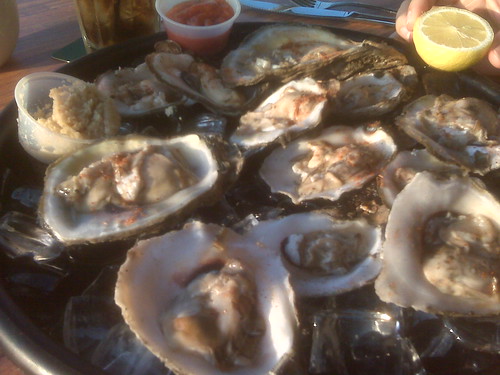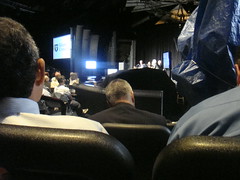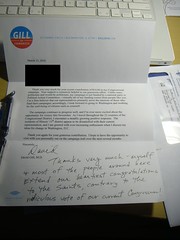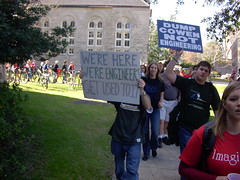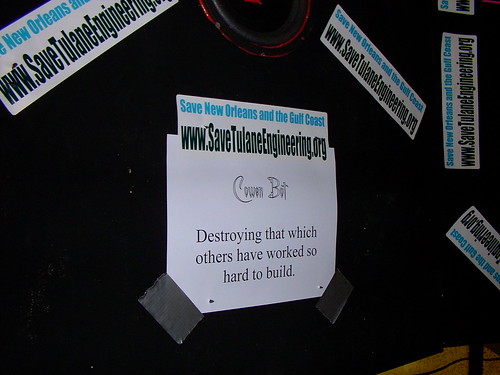Got a chance to attend the
2010 Tulane Engineering Forum yesterday. It's been evolving into the most interesting engineering conference in the city. There's a good chunk of the city's P.E.'s that attend it every year, including lots of business owners. There's also always at least one presentation every year on the state levees. Partly because of the technical proficiency of the audience, you get some extremely in depth and thorough debate.
Last year's introductory session {PDF} was given by the Corps and I'm told they spent the whole time praising all the things that are being fixed up and all the good things the Corps has done. I'm told that there was some interesting back and forth at the end of their presentation, but I don't know the details, so that's all I'm going to say about that for now.
This year's presentation was by Dr. Dalrymple, Dr. Bolard (PE), Dr. Christian (PE), and Dr. Reed. They were a part of the National Research Council's team that worked for the Corps on
LACPR, basically the task force that Congress appointed to design "Category 5 Levees."
As we all know, to date, there is no solid plan for Category 5 Levees. The most up to date thing the Corps came up with was a "menu of options" (111 in total) that was
slammed when it came out. The Corps, despite billing themselves as the premier coastal engineers in the country, left it up to Congress to make the ultimate determination of what would get done. While there are some political implications (see Oyster's post), the panel went through some of the scientific and engineering challenges that also pose problems.
First to present was Dr. Dalrymple. His main points were the lack of a "sediment budget" for the lower Mississippi River. The loss of sediment load and sedimentation action is the #1 coastal loss issue, according to him. This was one of his slides:
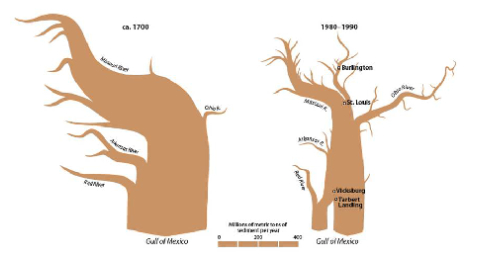 Source
SourceAs a side note, if you were to poll the top 100 coastal Louisiana experts on what the biggest problem is, probably 95 would say either canals, primarily for oil and gas exploration, or sediment loss, primarily due to levees confining the Mississippi River. When you have someone from the Corps speak, they tend to play up the canals and when someone from the oil industry speaks, they tend to play up the sediment loss. All four presenters, while nominally affiliated with the Corps, were heavily into the sedimentation camp.
Dr. Dalryrmple went on to comment about to designing a "Category 5 Levee" system. It would be more accurate to describe what New Orleans needs as a 400-1,000 year level of storm protection. No matter what is built, some local cooperation is needed for non-structural mitigation strategies, such as zoning, building codes, and buyouts.
In the end, Dr. Dalrymple held a fairly pessimistic view of the future. When asked what was the NRC's influence on the Corps' plans, Dr. Dalrymple described it as "subtle." The audience of engineers nervously laughed.
Dr. Bolard was the next to present. He once again railed against the failure to take advantage of sediment, both with beneficial use of dredged materials and how we're still directing the majority of the sediment load that comes past the city off the continental shelf into hundreds of feet of water. 125 Million Tons per year of sediment are wasted in this way. Dr. Bolard pointed out that all of the plans from the Corps assume that we'll have basically the same coastline as we do now in 50 years, despite the fact that we lose 24 square miles of coastline per year and that trend has been more or less unchanged for 80+ years! The bulk of Dr. Bolard's remaining presentation was a complicated discussion of the Corps' attempt at using
MCDA to whittle down the 111 plans into one or a few actionable items. He described the multiple attempts as failures, for a variety of reasons.
Dr. Christian was next to present and he had by far the best presentation of the group. I'll actually skip over most of his presentation because I want to come back to it in a later post. He mostly talked about the "600-lbs. gorilla in the room: the Corps' performance before during and after Katrina." He started off by listing things that Corps has done into 3 categories: things that have been blamed on the Corps, but aren't really their fault, things the Corps has done well, and thing the Corps has done "not so well."
On the things the Corps gets blamed for, but isn't really their fault, he claimed: split responsibility, Louisiana politics, and a few other minor things. He gave one example of a specific floodgate that has 5 different entities "controlling" it (railroads, roadways, the local levee board, and the Corps). He said that they looked up the operation procedures of each of the organizations and each one assumed that someone else would close the gate in the event of an approaching storm! Also, Louisiana's political scene doesn't do us any favors nationally when hunting for funds to build the levees.
Dr. Christian's list of things the Corps does well were Task Force Guardian, IPET, and the Corps' hydraulics and hydrology understanding. He particularly singled out the Vicksburg office for their understanding of hydrology.
Dr. Chrisian's list of things the Corps does "not-good" was pretty scary. First, he says that all too often you'll have a representative from the Corps, say that the Corps has never had a failure. He says that if you put enough modifiers and adjectives in there, you can get a strictly factual statement, but, in the end,
THE LEVEES FAILED!  NOAA via Wikipedia
NOAA via WikipediaIt's sad to say, but the Corps failed, the Corps failed, the Corps failed. He said it needs to be
drilled in that the Corps' levees failed from Katrina's glancing blow under stresses far below their design capacity. The Corps-built levees resulted in the worst civil engineering disaster in American history. Dr. Christian was adamant that that fact not be overlooked in any way.
Dr. Christians other two serious criticisms was the Corps' geotechnical and soils analysis, especially with the New Orleans office is fundamentally flawed. He said that was his professional opinion and that he knew there were lots of people with the Corps that would take strenuous objection to the statement. Note that the debate
safe water level in the outfall canals has been extremely contention because of just this issue.
Dr. Christian's last "not so good" Corps procedure was that peer review, while successfully implemented under TF Guardian and IPET, has become a "box-check" and not a real concerted effort. Getting any information out of the Corps is like pulling teeth and there's outright hostility to "outsiders" looking over the Corps' design process.
Dr. Christian made a lot of bold statements, but between the slides and his response to engineers' questions, he seemed to back them up, IMHO.
Dr. Reed was the last one to present. She spoke of the need to manage flood protection, navigation (remember, the reason New Orleans exists), and coastal restoration. We managing the lower delta (where to chop it off) is the big issue for the next 50 years. We don't have the sediment load to preserve everything that exists today, so we need to do some triage. She also mentioned that Mississippi is extremely concerned with any effort to gate the mouth of Lake Pontchartrain because of its effects on Mississippi Gulf Coast storm surges (probably increasing them).
Where does all this leave us? One attendee who saw both plenary sessions (2009 Corps and 2010 NRC/LACPR) described them as presenting "quite a different picture." Currently, we have no plan for Category 5 Levees. The Corps says they'll come out with a plan 'this summer,' but we'll see if/when it comes out and if it's just another "menu" of options. The full presentation will also eventually be uploaded to
this page.
NOTE- Minor edits. Also, Dr. Christian praised the Times-Picayune coverage of the situation. He says they've done a better job of informing the locals of the challenges facing the city than anyone has ever given them credit for (and it's not like they've been ignored).
UPDATE-
Looks like Mike Schleifstein made it. His article looks along the same lines as mine, but I've got a few more details and he's got a few more links. Also, he caught that the new due date for "Category 5 Levees" is July. I just caught summer.
UPDATE 2 -
Presentations OnlineUPDATE 3 -
The Corps' summer plan is out and it's yet another "Menu of Options"
